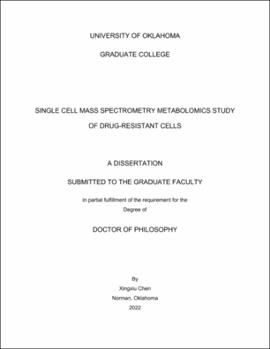| dc.contributor.advisor | Yang, Zhibo | |
| dc.contributor.author | Chen, Xingxiu | |
| dc.date.accessioned | 2022-05-09T16:05:33Z | |
| dc.date.available | 2022-05-09T16:05:33Z | |
| dc.date.issued | 2022-05-13 | |
| dc.identifier.uri | https://hdl.handle.net/11244/335634 | |
| dc.description.abstract | Single cell analysis is an emerging area to reveal the heterogeneity of individual cells among all populations. Understanding the cell-to-cell variation can greatly promote the development of drug discovery, disease diagnostics and prognostics. Metabolites, the end products of cellular metabolism, directly reflect the phenotype, status, and microenvironment of cells. Single-cell metabolomics is the study of complete metabolites’ profiles in individual cells under certain conditions, illustrating the biological heterogeneity among different cells. Numerous studies of single cell metabolomics have been achieved, and the pioneering work is benefited from technology development in this field. The analytical techniques utilized for single cell metabolomics primarily include fluorescence, electrochemical analysis, and mass spectrometry, whereas the integration of different analytical tools can provide additional molecular information of single cells. My Ph.D. studies mainly focus on single cell mass spectrometry (SCMS) metabolomics studies of drug-resistant cancer cells. This thesis consists of four chapters. Chapter 1 introduces the background information covering the current MS-based techniques for SCMS studies to date. In Chapter 2, I summarized the major projects that I accomplished. Studies in Chapter 3 are focused on elucidating the influence of combinational drug treatment. The Single-probe SCMS technique was utilized to study the metabolomic changes of Irinotecan-resistant cells upon metformin treatment and metformin-Irinotecan co-treatment. Combinational index values calculated by Chow-Talalay method verified the synergistic effect between metformin and irinotecan in our cell models, enzymatic activity assay of fatty-acid synthase was further performed to the possible mechanism of synergistic interaction. In Chapter 4, a workflow was designed to combine the Single-probe SCMS technique with fluorescence microscopy to study cell-cell interactions in co-culture systems involving cells with different levels of anticancer drug resistance. | en_US |
| dc.language | en_US | en_US |
| dc.subject | Single cell analysis | en_US |
| dc.subject | Mass spectrometry metabolomics | en_US |
| dc.subject | Metabolic analysis | en_US |
| dc.title | Single Cell Mass Spectrometry Metabolomics Study of Drug-resistant Cells | en_US |
| dc.contributor.committeeMember | Wang, Bin | |
| dc.contributor.committeeMember | Shao, Yihan | |
| dc.contributor.committeeMember | Wu, Si | |
| dc.date.manuscript | 2022-04-29 | |
| dc.thesis.degree | Ph.D. | en_US |
| ou.group | Dodge Family College of Arts and Sciences::Department of Chemistry and Biochemistry | en_US |
| shareok.orcid | https://orcid.org/ 0000-0002-1856-6219 | en_US |
| shareok.nativefileaccess | restricted | en_US |
